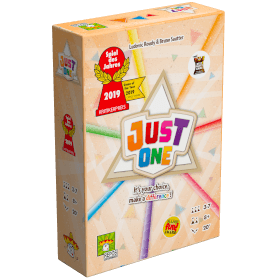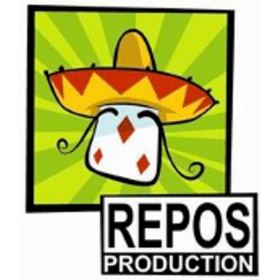Just One
 Da pistas de una palabra para que alguien pueda adivinar una palabra, pero se descartan las pistas duplicadas.
Da pistas de una palabra para que alguien pueda adivinar una palabra, pero se descartan las pistas duplicadas.
Just One es un juego cooperativo en el que juegan juntos para descubrir tantas palabras misteriosas como sea posible. Encuentra la mejor pista para ayudar a tus compañeros de equipo. ¡Sé único, ya que todas las pistas idénticas serán eliminadas!
Una partida completa se juega con 13 cartas. El objetivo es conseguir una puntuación lo más cercana posible a 13. En caso de respuesta correcta, los jugadores obtienen 1 punto. En caso de respuesta incorrecta, pierden la carta actual y la carta superior del mazo. Perdiendo así 2 puntos. En caso de falta de respuesta, los jugadores sólo pierden la carta actual y, por tanto, sólo 1 punto.
Tú tienes la opción: ¡marca la diferencia!
Número de jugadores: 3 - 7
Duración de la partida: 25 mn
Complejidad: 0 / 5
Juega Just One y 978 otros juegos en línea.
No es necesaria ninguna descarga - juega directamente desde tu navegador.
Con tus amigos y con miles de jugadores del mundo entero.
Gratis.

Juega Just One y 978 otros juegos en línea.
No es necesaria ninguna descarga - juega directamente desde tu navegador.
Con tus amigos y con miles de jugadores del mundo entero.
Gratis.

Sumario de reglas
Overview
Just One is a cooperative party game where you get other players to guess mystery words by the team writing secret clues that help corroborate what the Mystery Word is.
Choose your word carefully since any identical clues from your team will be eliminated.
Gameplay
- 1) A mystery word is presented.
- 2) Each player writes a single-word* clue on their board.
- 3) The game removes exact matches.
- 4) One player reviews the remaining clues. Any identical and/or invalid are removed (see Eliminated Clues). (If all clues have been removed, the turn is now over!)
- 5) The active player guesses the mystery word, or opts to pass.
* With three or four players, every player offers two clues.
Clue Validity
Acceptable Clues
Names (proper nouns), numbers, acronyms, onomatopoeia, and special characters are all valid clues.
Examples:
- Mickey is allowed as a clue for Mouse
- 007 is allowed to help someone guess Bond
- Riiing or SMS are allowed to help someone guess Telephone
- $ is allowed to help someone guess America.
Eliminated Clues
Identical
- Identical words. Example: Mouse and Mouse (or mouse) are identical (usually done by game).
- Words with the same base. Japan and Japanese are considered identical.
- The same words in the singular and plural. Example: Horse and Horses are considered identical.
- The same words with spelling mistakes. Example: Rhythm and Rythem are considered identical.
Invalid
- The mystery word written differently. Example: Shirt → Shurt or Color → Colour
- The mystery word written in a different language. Example: Green → Vert
- A word in the same family as the mystery word. Example: Prince → Princess.
- An invented word. Example: Cake → Swee’ting
- Homophones (a word phonetically identical to the mystery word with a different meaning). Example: Weather → Whether
Results
- Success: If the active player correctly guesses the Mystery Word, score 1 point.
- Failure: If the active player makes a wrong guess, do not gain the point, AND discard the next card in the stack. If the card guessed was the last card, lose a point.
- Skip: If the active player chooses not to answer, skip their turn and do not gain the point.
End of Game
The game ends after 13 rounds. Guessing all 13 mystery words correctly is a perfect score.
Interpretations of the rules
The rules about identical and invalid words have some ambiguities and it can be debatable whether words are valid or not. Exact duplicates are removed automatically, but the player who will guess after the current guesser is responsible for striking out other invalid words.
- • You should never strike out a word just because you don't understand how it clues the mystery word or because you think it's an unhelpful clue.
- • The "family" of "words in the same family" is sometimes debatable. Words which share components may clash (e.g. in sandcastle and quicksand the sand component is significant enough that many players would consider it a clash) or may not (e.g. in unclear and uncertain the un- prefix is probably not enough to clash). Sometimes words which look extremely similar are actually derived from very different origins.
- • The rule that translations are invalid clues is a frequent source of disagreements, especially when players speak different languages. Some players consider that a word which is found in standard dictionaries of the language you're playing in can be considered not to be a translation. Others think that if the mystery word is hat then sombrero is not a valid clue, because it's the generic Spanish word for hat and this makes it irrelevant that it's been adopted into English to refer to a particular style of hat.
The rules for 3 players do not make any specification whether or not the two clues may extend each other. However, some players prefer not to allow the usage of two words as a single clue, but that rule is not official and should be agreed upon beforehand.
If you're not sure then it's possible to ask in the chat whether other people think that there's a clash, being careful not to give away the debatable word or words.


